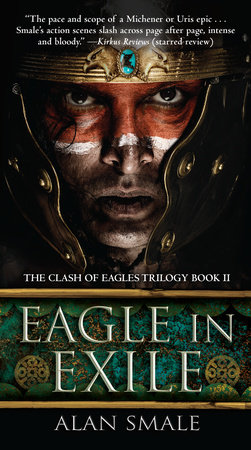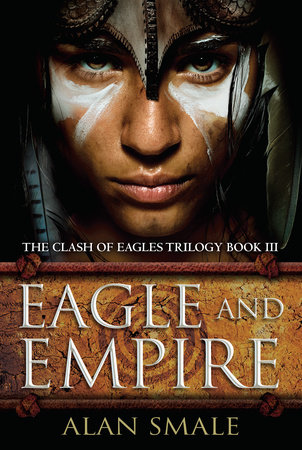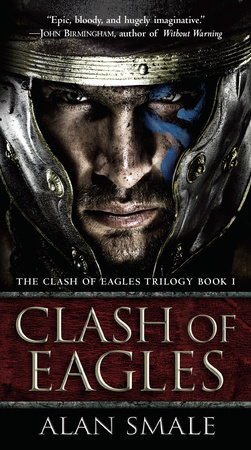Excerpt
Eagle in Exile
Chapter 1
Year Three, Thunder Moon
The sky was overcast, the air thick with humidity. The Iroqua captives sweated in their corral in the East Plaza, with the Great Mound and the Mound of the Smoke looming over them on either side. They had been imprisoned there for many weeks in all kinds of weather, with no shelter and minimal food. Water was provided twice daily from a single well-guarded jar. They could drink only as much as their cupped hands would hold.
Marcellinus had seen his fair share of suffering but rarely such extended neglect. Even the slave pens in the ports of Europa and Aethiopia had roofs and reasonably plentiful fodder, but slaves had resale value, and these braves had none.
Cahokian Wolf Warriors ringed the corral. There would be no breakouts or rescue attempts, and even if the gates were opened, the captives would be too weak to run.
These were Cahokia’s sworn enemies, brought as low as men could get. This was the fate the rest of the Iroqua nation would face if Great Sun Man could bring it about.
Marcellinus had little sympathy for the prisoners. Any of these men would have delighted in butchering him and the people he cared about, hacking off their scalps to wear on their belts. On the basis of the atrocities committed by Iroqua war parties in the upland villages, he had no doubt that Cahokians in an Iroqua corral would fare even worse. But he did think it was a waste.
Absently, he fingered the golden amulet that Enopay had found for him. He had turned it over and over in his hands so often over the last several weeks that the image of the Hawk warrior incised on its flat surface was beginning to wear down.
If Cahokia had gold and the Iroqua wanted it, the Mourning War would be comprehensible. But it did not. And if the Iroqua had wanted Cahokian women, they would have taken them after the battle. They had taken a few, but it was obviously not the prime reason for their attack.
Revenge was the only motivation left. But really, revenge for what? Where could such unreasoning hatred have come from?
Marcellinus had been standing for some time before he noticed that he was not alone. Just a hundred feet away stood Pezi, who was also staring at the prisoners.
Deep in his own reverie, Pezi jumped when Marcellinus arrived at his side. Marcellinus had not seen the word slave from Etowah since the previous winter.
Embarrassingly, Pezi fell to his knees. “Wanageeska!”
Marcellinus had forgotten how abject a creature the boy was. “Gods’ sakes, Pezi, stand up and pretend to be a man.”
Pezi stood, eyes still downcast. He had grown an inch or two, and wisps of new hair adorned his chin and cheeks.
“Where were you during the battle, Pezi?”
“I fight for Cahokia,” Pezi said.
Marcellinus regarded him calmly. “Who saw you fight?”
Pezi hesitated. “No. I hide down in a grain pit, under a house. I am not good to fight.”
“Again?” Such a pit was where they originally had found Pezi, in the mound-builder town of Woshakee up the Oyo River.
Pezi was taller and probably stronger than Tahtay, who had valiantly tried to fight and had suffered a terrible injury to his leg in the attempt. Marcellinus swallowed. “What do they want, Pezi?”
“Who?”
Marcellinus waved at the prisoners.
Pezi shook his head. “To die quickly, I think.”
“All the Iroqua. They want Cahokia destroyed, the Mizipian people scattered, scalped, or buried in the earth? Or do they want something else?”
“I do not know.”
“Then let’s ask them.”
Grabbing the boy’s arm, he began to walk forward. Pezi resisted, standing his ground. “No!”
“You still speak Iroqua?”
“Of course. But you will learn nothing from those men. Even if they have anything to tell, they will not tell you.”
“You know the Iroqua,” Marcellinus said bluntly. “You speak their language. And here they are, attacking Cahokia. But really, Pezi, why? For Cahokian land? Cahokian corn and women? Access to the Mizipi? Roman weapons? I don’t think that’s all of it. I really don’t.”
“I do not know.”
Marcellinus loomed over the boy and held his gaze. “You understand your life belongs to me?”
“Yes.”
“And you know I can have you put in there—” He indicated the corral. “—with just a single word?”
Pezi gave a little whimper.
“I’ve lost my legion and most of the friends I once had here. I have very little left to lose, Pezi. And you would not be the first translator I’ve killed for talking out of both sides of his mouth. So tell me the truth before I lose patience. What do you know?”
“The Iroqua fear Cahokia,” said the boy. “There was war in the past. Many Iroqua raids and Cahokian raids. Now, with you here, the Iroqua fear that the People of the Mounds will come and kill them all. So they must strike first.”
“Nonsense.”
“Yes. Haudenosaunee lands and lakes are small, and the Cahokian and mound-builder rivers are long. And now Cahokia rules the air. What else can the Iroqua do?”
Just what Marcellinus had thought when he saw Sintikala’s great map of Nova Hesperia. But hearing the words from Pezi’s mouth made him resist the idea. “Cahokians do not want Iroqua lands. What threat is there to the Iroqua from mound builders? Will Cahokians force Iroqua to build mounds? No. What reason is that to attack mound-builder villages and towns and wage war on Cahokia itself?”
Pezi looked away. “As you say.”
If Cahokia were Roma, the threat to neighboring lands would be obvious. But Great Sun Man was not an Imperator, and surely the Iroqua lands had nothing that Cahokia could possibly want.
“Pezi, how did the Mourning War start between Iroqua and Cahokia?”
“Because of you, making Cahokia stronger.”
“No. Long before me. Generations ago. Was it because the Iroqua wanted Cahokian women?”
Pezi paused. “Long past, many lives ago, this city was not here.”
“And before? Did the Iroqua live here?”
The boy laughed scornfully. “By this big greasy river that bursts its banks every spring? The Iroqua would not live here. But on the Oyo, the Iroqua were strong. Then came Cahokia, and then the Oyo belonged to the mound builders, too, and the Iroqua had only the lakes.”
Marcellinus thought about it. “Pezi, the time may come when I will ask something of you. It will be just one thing, but you must do it. Afterward you will owe me nothing. Your life will be your own. But if you do not do what I ask, the whole of this land will not be big enough for you to hide from me. Do you understand?”
Pezi was already pale and shaking. “What must I do?”
Marcellinus released the boy. “When I am ready, I will tell you.”
“I am looking for Wachiwi,” Marcellinus said.
The warrior Takoda sat cross-legged on the ground. His left arm cradled Ciqala, his son of two winters; his right arm was splinted and heavily bandaged from the wounds he had received protecting Marcellinus in battle. From the other side of the fire his wife, Kangee, made a wordless grunt of disgust. Their newborn, whose name Marcellinus did not know, lay sleeping in a cradleboard on Kangee’s back as she built the fire.
If it had been only Takoda, Marcellinus might have explained. But he did not really care what they thought, and especially he did not need to explain himself to Kangee, who had always loathed him.
“Is Wachiwi alive? Just tell me where she is.”
“Ask Hanska,” said Takoda.
Marcellinus was taken aback. He would not have thought that the fierce warrior woman Hanska and the gentle Wachiwi would know each other. “And where is Hanska?”
Takoda nodded to the southeast, then sighed. “The way is hard to describe. I will fetch Hanska here to you if you will bring us firewood and water.”
“I would bring you firewood and water anyway if you asked,” Marcellinus said.
Kangee spit into the fire. It fizzled. “We don’t need his help.”
“With two babies, and Ina like that?” said Takoda wearily, nodding toward the hut where his mother, Nahimana, lay. “And me with a smashed-up arm? If we don’t need help, who does?”
Kangee stalked off without another word, squatting in front of a neighbor’s fire and casting foul looks over her shoulder. Once she was safely out of earshot, Takoda said after her, “Hey, by the way, Marcellinus saved my life at Woshakee.”
Takoda was referring back to a conversation many moons ago, a lie that Hanska had suggested he tell Kangee to make her warm to the Roman. Marcellinus smiled, grateful at even the pretense of humor on such a dour day. Shrugging sadly, Takoda put his son on his hip and walked away across the Great Plaza.
Marcellinus fetched a wheelbarrow and packed as much wood into it as he could. On his second trip he brought back four large jars of water. He also brought one of the new metal fire stands and a cooking pot that was the right size to fit it. By the time Takoda returned with Hanska by his side, bouncing Ciqala in her arms, Marcellinus had restarted the fire, heated water, and stepped down into their hut to bathe the still-comatose Nahimana.
Nahimana had survived the sack of Cahokia by the Iroqua with flying colors. She had worked without cease or sleep for the next two days looking after the wounded and then, quietly and with little fuss, had suffered a stroke. Now, two moons later, she still lay unconscious most hours of the day. The left side of her face hung piteously slack. Yet another casualty of war on Marcellinus’s conscience.
Takoda looked sad. “Wanageeska, you don’t have to do that.”
“Yes, I do.”
Hanska cleared her throat and handed Ciqala back to his father. “Need help, sir?”
It was the first time Hanska had ever called him “sir” as if she meant it.
“Yes. Help me turn her over. Wait outside, Takoda. No son should see his mother like this.”
Gently and almost effortlessly, Hanska hefted the frail form of the elderly woman and rolled her onto her front. As for Hanska, long smears of the white salve on her legs and right shoulder were the only remaining signs of the wounds she had sustained fighting the Iroqua, though she seemed to favor her right side. “So you want Wachiwi?”
“Just to talk with her.” Marcellinus rinsed his cloth in the pot of warm water.
“Talk only?”
“Yes. Believe it or not.”
Hanska plucked the cloth from his hand. “This is woman’s work. I am still a woman,” she said, and took over the task of cleaning Nahimana, doing it more thoroughly than Marcellinus would have dared. Grateful, he looked away.
When they left the house, Kangee was back.
“Hey, little Kangee,” Hanska said. “If the Wanageeska wants Wachiwi, he wants Wachiwi. Is it for you to sneer?”
“I did not speak of this to you, warrior,” Kangee said.
“Well, I speak of it now. Answer me.”
“It’s all right, Hanska,” said Marcellinus.
Hanska loomed over Kangee, and the shells braided into her hair rattled. “He’s saved Cahokian lives. Made us strong. The Wanageeska has done more for Cahokia than you ever will. All you do is breed and spit.”
Takoda stood. “Hanska. Please.”
“Come on, then,” she said to Marcellinus.
They walked a little west of south, past a flooded borrow pit toward an area of Cahokia where Marcellinus rarely went, the neighborhood of the cloth workers, leather tanners, and makers of moccasins. Despite lying on a line directly between the two main battles with the Iroqua, it appeared relatively unscathed.
Hanska strode beside him. Marcellinus had never been alone with her before. He wanted to thank her for keeping him alive, for standing over him and defending him as he lay stunned from the Huron’s club, but he knew she would say something offhand and contemptuous if he dared mention it. After all, he would have done the same for her. They were warriors. “So you know Wachiwi?”
“Yes.”
Marcellinus eyed her, uncertain. She looked irritated. “What? No. What you are thinking now? All men think that, because they are men. But Wachiwi and I have not been lovers. We were friends long ago, as children.”
This was a surprise. “I would not have thought it. You are very different.”
“You say so? Because I am not pretty like Wachiwi?”
Once again the ground was shifting under his feet. Marcellinus really was “no good chieftain of women,” as Sintikala once had told him. “I did not mean—”
“We were different from other girls. She was Onida, taken from the Iroqua. And I was not girl-like.”
Marcellinus remembered Tahtay’s young friend Hurit, bloodied by bullies the previous year for being too interested in making bricks in Marcellinus’s brickworks. “Yes, I see.”
Hanska threw him another sharp look. I see? Yes, he had said the wrong thing again, implying an insult.
In fact, Marcellinus found Hanska spectacular. Well muscled, statuesque, but still strikingly female, she could have been cast in marble in the Roman Pantheon. But she was one of his warriors. It would not be proper to tell her that.
Futete. He would never lead the First Cahokian in battle again. But still she daunted him. He resorted to hand-talk. You strong. Beautiful. I sorry.
Hanska faltered and dropped her gaze. Perhaps she was regretting saving his life. But when he looked back, he found she was making hand-talk, too. We know what it is to be different. That why you-I friends, too.
Wachiwi, Hanska, Marcellinus. All outsiders. All very different. Marcellinus was embarrassed that he had never before thought of Hanska as a friend.
“I have bearberry tea,” he said. “Let us drink some.”
Finally he earned a grin. “You want to see Wachiwi.”
“At another time, then. As friends.” Her husband, Mikasi, he now remembered, was also an outsider, born far away in the grassy prairies across the Mizipi to the west of Cahokia. How ignorant he was about people that it took him so long to decode such obvious connections.
Hanska leaned in to him. “Maybe. But sir? This time, be more nice to Wachiwi. Or you and I will never drink tea.”
A hot flush filled Marcellinus’s cheeks. Naturally, Wachiwi would have spoken to Hanska of her brief physical relationship with him. All at once the warrior woman’s habitual rudeness and overfamiliarity made sense.
“I mean Wachiwi no harm,” he said. “If I hurt her, I did not mean to.”
Hanska laughed. “Do not worry. Wachiwi is tougher than either of us.”
They had walked past the last of the leatherworkers and were approaching a single house standing apart from the others, close to a low ridge mound. A small figure had seen them coming and was waiting outside.
Wachiwi and Hanska hugged. It was odd to see, the tall and muscular clasping the petite and shapely.
Wachiwi made no move to greet Marcellinus but regarded him neutrally, her arm still around Hanska’s waist. He cleared his throat. “Hello, Wachiwi.”
“It is all right?” Hanska said to Wachiwi in the tenderest tone he had ever heard from her.
Wachiwi nodded.






